|
|
|
Sort Order |
|
|
|
Items / Page
|
|
|
|
|
|
|
| Srl | Item |
| 1 |
ID:
163763
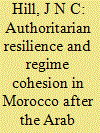

|
|
|
|
|
| Summary/Abstract |
This article argues that Morocco's competitive authoritarian regime is more resilient today in certain key respects than it was when the Arab Spring began. Drawing on Levitsky and Way's dimension of organisational power, the article contends the regime was sufficiently unnerved by the unrest to resort to the use of high intensity coercion as part of its response to the 20 February Movement. The article maintains that, in employing this force successfully, the regime has turned the protests into an important source of non-material cohesion for its security apparatus and thereby enhanced its ability to defend itself from similar challenges in the future.
|
|
|
|
|
|
|
|
|
|
|
|
|
|
|
|
| 2 |
ID:
163759
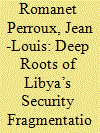

|
|
|
|
|
| Summary/Abstract |
Six years after the 2011 revolution that toppled the Gaddafi regime, the political transition in Libya is at a standstill. The fragmented security landscape fuels chronic local conflicts, lawlessness, and insecurity, and paralyzes the political transition with destabilizing consequences on its neighbors. What explains the rapid, profound, and lasting security fragmentation that affected post-Gaddafi Libya? Notwithstanding the manifest failures of the international intervention during and after the 2011 conflict, this article argues that the security fragmentation in post-Gaddafi Libya is deeply rooted in domestic economic, cultural, and political factors. In particular, the Libyan economy offers almost no employment opportunities, and the country lacks a unitary government and functioning state institutions that it needs to redistribute its oil wealth. Under these circumstances, Libyans attempt to cope with economic hardship, insecurity, and lawlessness by turning towards their family, tribe, neighborhood, or ethnic group, thereby fueling the fragmentation of security. Libya’s current security fragmentation and instability can be seen as part of the messy historical process of state formation. During this phase, political and security agreements are brokered and institutionalized through localized processes of rebel governance whose realm of possible arrangements are determined by contextual economic, political and cultural constraints.
|
|
|
|
|
|
|
|
|
|
|
|
|
|
|
|
| 3 |
ID:
163757
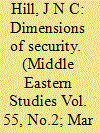

|
|
|
|
|
| Summary/Abstract |
The Arab uprisings’ failure to bring about either the scale or type of political change in the Maghreb that it initially seemed to promise belies the significance of its impact on the region. While Algeria, Mauritania and Morocco continue to be ruled by the same competitive authoritarian regimes that held power when the protests began, they, and the new governments in Tunisia and Libya, must now negotiate an altered and more dangerous security environment than before. The unsettling of Tunisia’s security apparatus and the outbreak of full-blown civil war in Libya have created new opportunities for terror and criminal groups to thrive and expand. The primary aim of this special issue is to chart and explain many of the critical changes in the Maghreb’s security environment that have occurred as a result of the Arab Spring. Each of the articles collected here identifies and analyses at least one important security issue in one or more Maghreb country as well as explain how that issue has emerged in response to or been affected by the Arab Spring.
|
|
|
|
|
|
|
|
|
|
|
|
|
|
|
|
| 4 |
ID:
163762
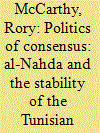

|
|
|
|
|
| Summary/Abstract |
Tunisia&s transition away from authoritarianism has been shaped by a politics of consensus, which has brought together representatives of the former regime with their historic adversary, the Islamist movement al-Nahda. This article argues that consensus politics was a legacy of the authoritarian regime that was re-produced during a democratizing transition. The politics of consensus was encouraged and enabled by al-Nahda, which prioritized its inclusion within this elite settlement to provide political security for itself and the broader transition. However, this came at a cost, engineering a conservative transition, which did not pursue significant social or economic reform. The Tunisian case shows that historical legacies, such as consensus politics, can shape a transition as much as contingent, pragmatic decisions by political leaders.
|
|
|
|
|
|
|
|
|
|
|
|
|
|
|
|
| 5 |
ID:
163760
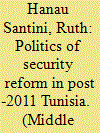

|
|
|
|
|
| Summary/Abstract |
In post—2011 Tunisia, the reform of the security sector has proceeded haphazardly, hindering security efficiency and lowering the overall effectiveness in countering threats. Since 2015, the combination of three factors — external shocks, international actors' pressures and domestic configurations of political power — have paved the way for a progressive overhaul of the efficiency of security agencies. Following the 2015 terrorist attacks, that destabilized the political system and risked derailing the trajectory of democratic consolidation, European powers exerted pressure to improve efficiency in the security sector. Lastly, these push factors needed an enabling condition, a strong presidency of the republic, to make the changes happen. The measures adopted reflect a technical and supposedly depoliticized view of reforms, in line with a broader post‐interventionist trend in Security Assistance. Based on process-tracing, the analysis of primary documents and several in‐depth interviews carried out between 2015 and 2017, the article illustrates the workings of the policy process in the security arena. It sheds light on the conditions that made possible the adoption of reforms, the role external actors played in pushing for change and in creating a new multilateral mechanism, the G7+, which produced an unintended set of domestic consequences.
|
|
|
|
|
|
|
|
|
|
|
|
|
|
|
|
| 6 |
ID:
163761


|
|
|
|
|
| Summary/Abstract |
The concept of power and the ways to measure it are central to the literature on regional security providers. The predominant model has power rooted in material capabilities. This article recognizes that such capabilities are important but contends that for a state to be become a regional security provider, it must meet certain preconditions, foremost amongst them: possession of necessary material and ideational capacity; judicious employment of such power resources; and regional recognition of its leadership. Obvious as it may sound, effective leadership is also heavily contingent upon the domestic performance of regional powers. In this regard, the choice of Algeria and Morocco provides an interesting comparative case to broaden the traditional determinants of how to categorize regional security providers. Surprisingly, Morocco has been neglected in studies on regional security in the Maghreb and Sahel despite its rising ideational and economic influence in the region. Even Algeria has seen few studies use an integral approach to analyze its roles, orientations and performance as a regional security provider.
|
|
|
|
|
|
|
|
|
|
|
|
|
|
|
|
| 7 |
ID:
163758
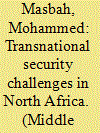

|
|
|
|
|
|
|
|